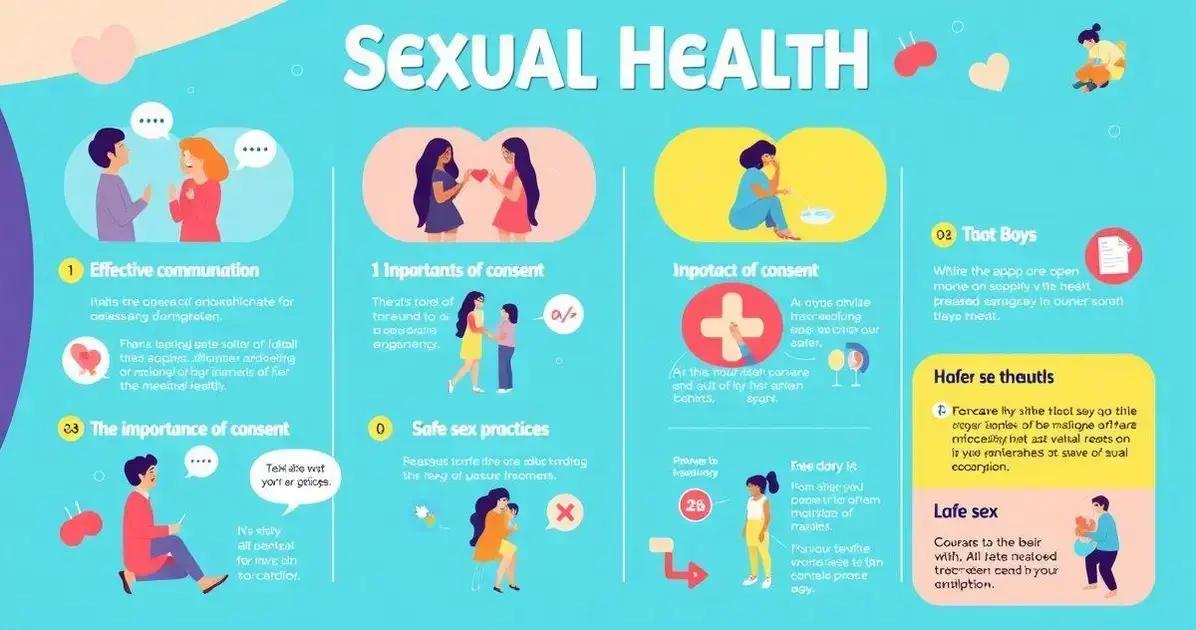Effective communication about sexual health in relationships involves understanding sexual health topics, engaging in open discussions, creating a safe environment, and practicing empathy and active listening. These strategies foster intimacy and trust, enhance emotional connection, and lead to a healthier relationship overall.
Effective communication about sexual health in relationships is essential for building trust and intimacy. By discussing these topics openly, partners can create a deeper connection. In this article, we’ll share five actionable tips to enhance your communication regarding sexual health. Understanding your own sexual health and being open to discussing it can help nurture a supportive environment, ultimately strengthening your relationship.
Understanding Sexual Health

Understanding sexual health is crucial in any relationship. It encompasses a broad range of topics including sexual function, sexual orientation, reproduction, and sexually transmitted infections (STIs).
To communicate effectively about sexual health, it is essential to be informed. Knowing the basics can help partners discuss their needs, desires, and boundaries openly. Sexual health is not only about avoiding illness; it also includes understanding pleasure and consent.
The Components of Sexual Health
Being knowledgeable about sexual health can empower individuals. This involves understanding bodily autonomy, the importance of consent, and safe sex practices. Partners should feel comfortable sharing their feelings and concerns without fear of judgment.
Education around sexual health can help dispel myths and reduce stigma. Learning about various methods of contraception and STI prevention plays a critical role in promoting overall health.
Regular Health Check-ups
Regular check-ups with a healthcare provider can ensure that partners are aware of their sexual health status. These appointments can provide opportunities to ask questions and receive professional advice, which fosters informed discussions at home.
Additionally, talking about sexual health with a healthcare provider can alleviate anxiety and encourage openness between partners. Remember, it’s important to discuss concerns honestly and openly without feeling embarrassed.
Importance of Open Discussions

Open discussions about sexual health are essential for nurturing a healthy relationship. They allow both partners to express their thoughts, feelings, and concerns openly. Without these discussions, misunderstandings and assumptions can arise, leading to conflict and anxiety.
When partners engage in open discussions, they create an atmosphere of trust. This trust encourages honesty and vulnerability, which are vital components in a loving relationship. Each partner should feel safe to share their experiences and preferences without fear of judgment.
Encouraging Communication
To promote open discussions, choose comfortable settings. Having conversations in a private and relaxed environment can make both partners feel more at ease. Timing is also important; bring up the topic when both partners are not stressed or distracted.
Using positive language can help foster a constructive conversation. Focus on “I” statements like “I feel” or “I would like” rather than placing blame. This can make it easier for your partner to listen and respond without becoming defensive.
Benefits of Open Communication
Engaging in open discussions not only improves sexual health understanding but also enhances emotional intimacy. When partners communicate openly, they are more likely to find common ground on expectations and boundaries.
Further, such discussions can lead to discovering new aspects of each other’s desires and preferences, making the relationship more fulfilling. Couples who engage in open and honest dialogue report greater satisfaction and closeness.
Creating a Safe Environment

Creating a safe environment for discussing sexual health is essential in any relationship. It allows both partners to share feelings, concerns, and experiences without fear. A safe atmosphere fosters open communication, making it easier to address sensitive topics.
Start by setting ground rules for communication. Agree that both partners will listen and respect each other’s opinions. When discussing sexual health, it’s crucial that neither partner feels attacked or belittled. Consider having these conversations when both partners are calm and relaxed.
Choose a Comfortable Setting
The setting of your discussion can greatly impact its effectiveness. Choose a quiet, private place where both people feel comfortable. This could be anywhere from a cozy living room nook to a peaceful outdoor setting. Eliminating distractions helps both partners focus on the conversation.
Practice Active Listening
Active listening plays a key role in creating a safe environment. It involves fully concentrating, understanding, and responding thoughtfully to what the other person is saying. Show your partner you value their input by summarizing their points and asking follow-up questions.
Refrain from interrupting or becoming defensive during discussions. Instead, acknowledge your partner’s feelings and validate their experiences. This approach nurtures trust and encourages ongoing dialogue.
Creating Trust and Vulnerability
Being open about your own feelings and vulnerabilities can help your partner feel safe to do the same. Sharing your experiences, fears, and desires establishes a sense of equality and trust. Vulnerability can lead to a deeper connection and understanding between partners.
Finally, reassure one another that sharing personal experiences is a normal part of a healthy relationship. By establishing a safe environment, you enhance your ability to communicate effectively about sexual health and other important aspects of your relationship.
Listening and Empathy in Conversations

Listening and empathy are vital skills in conversations about sexual health. They help deepen understanding and build trust between partners. When discussing sensitive topics, such as sexual health, practicing active listening shows that you value your partner’s feelings and thoughts.
Active listening means fully concentrating on what your partner is saying. This involves not just hearing their words but also understanding their emotions and intentions behind those words. Making eye contact and nodding can show that you are engaged.
Practicing Empathy
Empathy is the ability to put yourself in someone else’s shoes. When your partner shares their feelings or concerns about sexual health, try to understand their perspective. Responding with empathy reinforces that their feelings are valid.
You can express empathy by saying things like, “I can see why you feel that way” or “That sounds really difficult.” This kind of response encourages your partner to share more and feel supported during the conversation.
Creating a Responsive Dialogue
It’s important to respond appropriately based on what you hear. After actively listening, summarize what your partner has said to ensure you understand correctly. For instance, you might say, “So, you feel worried about how we communicate about our needs, is that right?” This practice not only clarifies understanding but also shows that you care about their perspective.
Additionally, remember to remain patient during the conversation. Sensitive topics may take time to express fully. Being supportive and giving your partner room to share (without rushing) can lead to more in-depth discussions.
Practicing listening and empathy in conversations can lead to stronger connections and better communication about sexual health in relationships. Partners who feel heard are more likely to engage openly.
Resources for Further Learning

To improve communication about sexual health in relationships, it’s helpful to access additional resources. Here are some valuable materials you can explore:
Books
Reading books related to sexual health can deepen your understanding. Look for titles like “The New Joy of Sex” and “Come as You Are” by Emily Nagoski. These books are informative and easy to understand.
Online Courses
Consider enrolling in online courses that cover topics about sexual health and effective communication. Websites like Coursera or Udemy offer courses where you can learn at your own pace.
Webinars and Workshops
Participating in webinars or workshops provides another excellent opportunity for learning. Many health organizations offer sessions focused on sexual health issues and relationship communication.
Reputable Websites
Visit reputable websites like Planned Parenthood or the American Sexual Health Association. These sites provide essential information, articles, and tips related to sexual health and communication.
Support Groups
Joining support groups can also be beneficial. They offer a safe space to discuss experiences and learn from others. Local community centers or online platforms often host such groups.
Utilizing these resources can enhance your knowledge and comfort level when discussing sexual health with your partner.
Enhancing Communication for a Healthier Relationship
In summary, better communication about sexual health is essential for fostering intimacy and trust in relationships. By understanding sexual health, engaging in open discussions, and creating a safe environment, partners can significantly improve their conversations.
Listening with empathy and utilizing available resources further strengthens the bond between partners. As you navigate these important discussions, remember that open and honest communication is key to a fulfilling relationship.
Implementing these 5 tips can lead to greater understanding, connection, and overall satisfaction in your relationship.
FAQ – Frequently Asked Questions about Communication and Sexual Health in Relationships
Why is communication about sexual health important in a relationship?
Communication about sexual health fosters intimacy and trust, allowing partners to express their needs and concerns openly.
What are some tips for starting conversations about sexual health?
Begin by choosing a comfortable setting and timing for the discussion. Use positive language and focus on ‘I’ statements to reduce defensiveness.
How can I create a safe environment for these discussions?
Establish ground rules for communication, choose a private space, and practice active listening to ensure both partners feel respected and safe.
What role does empathy play in discussing sexual health?
Empathy allows partners to understand each other’s feelings and perspectives, reinforcing trust and openness during conversations.
Where can I find resources to learn more about sexual health?
You can find valuable resources in books, online courses, reputable websites, webinars, workshops, and local support groups.
How can I improve my listening skills during these discussions?
Practice active listening by paying full attention to your partner, summarizing their points, and responding thoughtfully without interrupting.













